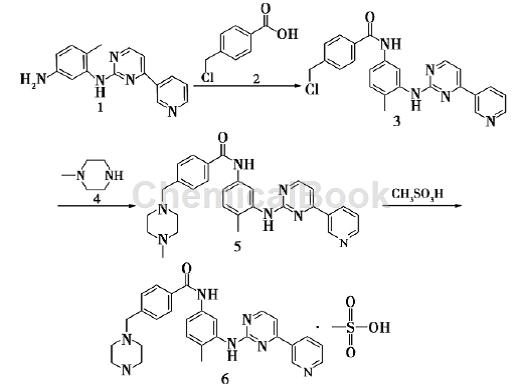Background and overview[1][2]
N-(5-Amino-2-methylphenyl)-4-(3-pyridyl)-2-aminopyrimidine is also known as imatinib in Chinese and is mainly used to synthesize imatinib. Imatinib Mesylate is a tyrosine kinase inhibitor drug developed by Swiss Novartis. It is an aniline quinazoline compound. It was approved for marketing in the United States and some European countries in May 2001 under the trade name “Glivec “. It has been approved for the treatment of chronic myelogenous leukemia in more than 80 countries around the world, and has also been approved for the treatment of gastrointestinal stromal cell tumors in many developed and developing countries. In April 2002, it was approved for import by SFDA and was put on the market in the same year under the trade name “Gleevec”.
Apply [1-3]
N-(5-Amino-2-methylphenyl)-4-(3-pyridyl)-2-aminopyrimidine is mainly used in the synthesis of imatinib. There are many methods, examples are as follows:
1. Synthesis of imatinib

Step 1: Synthesis of 4-chloromethyl-N-[4-methyl-3-[[4-(3-pyridine)-:2-pyrimidine]amino]phenyl]-benzamide
Add 250.0 g N-(5-amino-2-methylphenyl)-4-(3-pyridyl)-2-aminopyrimidine and 625.0 g anhydrous potassium carbonate into the 20 L reaction kettle. and 5.0 L tetrahydrofuran, slowly add 168.3 mL p-chloromethylbenzoyl chloride into the reaction system under the conditions of 0 to 10°C. After the dropwise addition is completed, the insulation reaction is completed. TLC detects that the raw material disappears. Add 500.0 mL purified water, incubate for 4 hours to crystallize, filter, and dry under vacuum to obtain 4-chloromethyl-N-[4-methyl-3-[[4-(3-pyridine)-2-pyrimidine] Amino]phenyl]-benzamide 332.2 g, yield 85.7%, purity 99.2%.
Step 2: 4-[(4-methyl-1-piperazine)methyl]-N-[4-methyl-3-[[4-(3-pyridine)-2-pyrimidine]amino] Synthesis of phenyl]-benzamide
Add 330.0 g 4-chloromethyl-N-[4-methyl-3-[[4-(3-pyridine)-2-pyrimidine]amino]phenyl]- into a 3 L reaction bottle Benzamide, 1.7 L N, N-dimethylformamide, cool the reaction system to 5 to 10°C, then add N-methylpiperazine dropwise, and add 0.7 L N-methylpiperazine dropwise to In the reaction system, after the dropwise addition, continue the heat preservation reaction. TLC detects that the raw materials disappear. Place the reaction solution in a dropping funnel at room temperature and add it dropwise to 17.0 L of crystallization solvent [V (water): V (absolute ethanol) ) = 3∶1], after the dropwise addition, the crystallization was maintained for 8 h, filtered, and dried under vacuum to obtain 4-[(4-methyl-1-piperazine)methyl]-N-[4-methyl-3 -[[4-(3-pyridine)-2-pyrimidine]amino]phenyl]-benzamide 333.0 g, yield 87.9%, purity 99.2%.
Step 3: 4-[(4-methyl-1-piperazine)methyl]-N-[4-methyl-3-[[4-(3-pyridine)-2-pyrimidine]amino] Phenyl] benzamide mesylate (imatinib mesylate)
Add 4-[(4-methyl-1-piperazine)methyl]-N-[4-methyl-3-[[4-(3-pyridine)-2-pyrimidine] into the 3 L reaction bottle ]Amino]phenyl]-benzamide 330.0 g, 1.7 L absolute ethanol, heat the reaction system to 50°C, then add methanesulfonic acid dropwise, complete the dropwise addition in 5 to 10 minutes, raise the temperature and reflux for 20 minutes. After cooling and crystallization, vacuum drying was performed to obtain 381.0 g of white crystal imatinib mesylate, with a yield of 96.5% and a purity of 99.6%.
2. Synthesis of imatinib intermediates
Suspend imatinib N-(5-amino-2-methylphenyl)-4-(3-pyridyl)-2-aminopyrimidine in a mixed system of inorganic alkali aqueous solution and organic solvent, Add p-chloromethylbenzoyl chloride solution dropwise at -20~40℃, the reaction time is 1~24 hours, and the reaction temperature is 0~60℃; reaction After filtering, washing and refining, the target product – imatinib intermediate is obtained. The positive effects are: using an inorganic alkali aqueous solution as the base and halogenated hydrocarbons as the solvent, the post-reaction treatment is simple, and the recovery of the solvent is convenient and fast; the preparation process has no pollution to the water body, and has low cost and high product yield, with a yield of up to 88 ~94.6%; suitable for industrial scale production. The reaction equation is:

Main reference materials
[1] CN201410636717.5 A synthesis method of imatinib
[2] CN201410281155.7 Preparation method of imatinib intermediate with environmentally friendly process
[3] Zhang Yanqiao, Wu Lihong, Sun Wentao, et al. Improvement of the synthesis process of imatinib mesylate [J]. Modern Chemicals, 2012 (2012 09): 47-49.

 微信扫一扫打赏
微信扫一扫打赏

